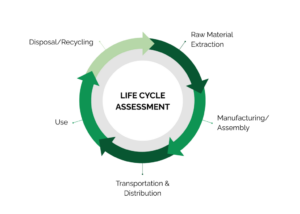A life cycle analysis (LCA) is an assessment of the environmental impacts of any activity from the initial extraction of raw materials from the soil to the point where all waste is generated and returned to the earth. This assessment includes all side stream releases to air, water and soil from the production of raw materials (including energy), use of the product, its final disposal as well as processing of the product. Life cycle assessments are used to identify and quantify both “direct” (e.g. emissions and energy use during manufacturing processes) and “indirect” (e.g. energy use, raw material extraction, product distribution, consumer impacts) impacts. [Scientific Applications International Corporation, 2006]. LCA’s systematic approach provides a true measure of the impact of a particular product or process. Unlike the environmental audit of an industrial process, which focuses on a specific facility and often only on-site activities, LCA looks at the interactions of the firm’s suppliers and customers in connection with their actions.

The result is a cradle-to-grave analysis of a product or management service. Life cycle assessment is defined as an attitude where manufacturers accept responsibility for pollution caused by their products, from design to disposal. This approach is very different from the traditional approach, starting with the purchase of raw materials and ending with the sale of finished products.
LCA can be used as a decision support system in determining which product or service method (waste management method) to use by evaluating the interconnectedness of all environmental impacts that may occur throughout the entire life cycle of a product or service.
